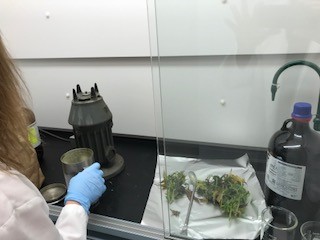
September 23, 2021 | Montpelier, VT - The Vermont Hemp Program reminds registrants of pre-harvest sampling and testing requirements for harvest lots and testing requirements for process lots. The Vermont Hemp Program Rules, effective on May 21, 2020, outline the minimum analyses to perform and require use of certified laboratories. A registrant may choose to perform additional testing on a harvest lot or at finished product stage. These additional analyses may be part of a marketing strategy, but may not be required by the Vermont Hemp Rules.
Pre-Harvest Sampling and Testing
- Pre-harvest sampling of each harvest lot is required.
- Samples must be taken no more than 28 days before harvest.
- Sampling Agents (which may be growers in 2021) are required to follow the pre-harvest sampling protocol.
- All harvest lot samples submitted to a laboratory shall be fresh plant material and accompanied by a pre-harvest sampling form completed by the sampling agent that reflects appropriate sampling procedures.
Pre -harvest lot samples must be tested for potency and moisture (potency must be reported on a dry weight basis). A registrant should also request a heavy metals analysis if the cultivation area has a prior non-agricultural or orchard use. However, a heavy metals soil test can satisfy this requirement without necessitating a test on the harvest lot material. Pesticide testing is also required if the harvest lot is not certified organic. These tests on harvest lots can fulfill requirements for process lot compliance.
The Hemp Program is flexible on when a registrant performs testing for heavy metals and pesticides. This can be completed on a harvest lot, post-harvest, or on a process lot using the post-harvest sampling protocol, and documented using the post-harvest sampling form.
If a harvest lot exceeds the acceptable potency level or the contaminant action limits both the certified laboratory and the registrant must report the test results to the Hemp Program.
- Certified laboratories send notifications to AGR.HempLabCertification@vermont.gov
- Registrants send notifications to AGR.Hemp@vermont.gov
Process Lot Testing
- Trim flower is considered a process lot and requires contaminant tests including:
- Moisture (or Water Activity)
- Microbiological (total yeast & mold, total aerobic bacteria, mycotoxins)
- Pesticides (if the original harvest lot was not tested for pesticides)
- Heavy Metals (if the original harvest lot was not tested for heavy metals)
Concentrates are also process lots and require the following tests:
- Microbiological (total yeast & mold, total aerobic bacteria, mycotoxins)
- Pesticides
- Heavy Metals
- Residual Solvents, if concentrated using a solvent based extraction process
Many of the testing requirements for hemp concentrates serve as compliance for hemp products and hemp-infused products, and it can be cost effective to test a concentrate for contaminants before using in products. Required contaminant testing is further explained on the Hemp Program blog titled REQUIRED TESTING FOR HEMP: ESTABLISHING PARAMETERS AND ACTION LIMITS, https://agriculture.vermont.gov/hemp-program/required-testing-hemp-establishing-parameters-and-action-limits.
Certified Laboratories
The Vermont Hemp Rules require use of certified laboratories for compliance testing. The Hemp Program maintains a list of certified laboratories and adds laboratories as they become certified, see attached list. Prior to contacting the certified laboratory, review the Vermont Hemp Rules or contact the Hemp Program for clarification on what tests are needed. Currently, there are laboratories certified to conduct testing in potency, moisture, total aerobic bacteria, total yeast and mold, and heavy metals. The Program has not certified a laboratory for pesticides, residual solvents and mycotoxins-registrants are able to use a laboratory of their choosing for these services. Collected samples may need to be split among multiple certified laboratories to obtain results.
Certified laboratories use validated methods, follow ISO/IEC 17025 testing guidelines, and report a measurement of uncertainty for total THC concentration. Using a non-certified laboratory unfamiliar with Vermont Hemp Program requirements could result in:
- Incorrect reporting of results (dry weight, units, measurement uncertainty),
- A failure to report noncompliance results to the Hemp Program
Questions about pre-harvest sampling can be directed to: Mike DiTomasso, Michael.ditomasso@vermont.gov.
Questions about contaminant testing and certified laboratories can be direct to: Stephanie Smith, Stephanie.Smith@vermont.gov.
Resources
- Pre-harvest sampling protocol, https://agriculture.vermont.gov/sites/agriculture/files/documents/PHARM/hemp/preharvest%20sampling%20protocol%208-2020%20updates.pdf
- Pre-harvest sampling form, https://agriculture.vermont.gov/sites/agriculture/files/documents/PHARM/hemp/VTPreHarvestSamplingForm08242020.pdf
- Post-harvest sampling protocol, https://agriculture.vermont.gov/sites/agriculture/files/documents/PHARM/hemp/VT_Post_Harvest_sampling_practice_Tables%20at%20end_Final.pdf
- Post-harvest sampling form, https://agriculture.vermont.gov/sites/agriculture/files/documents/PHARM/hemp/VTPostHarvestSamplingForm_4_9_21.pdf

